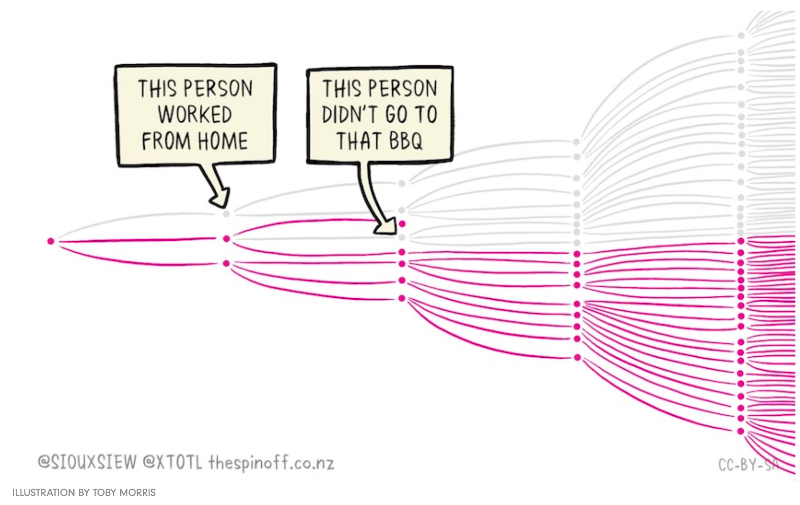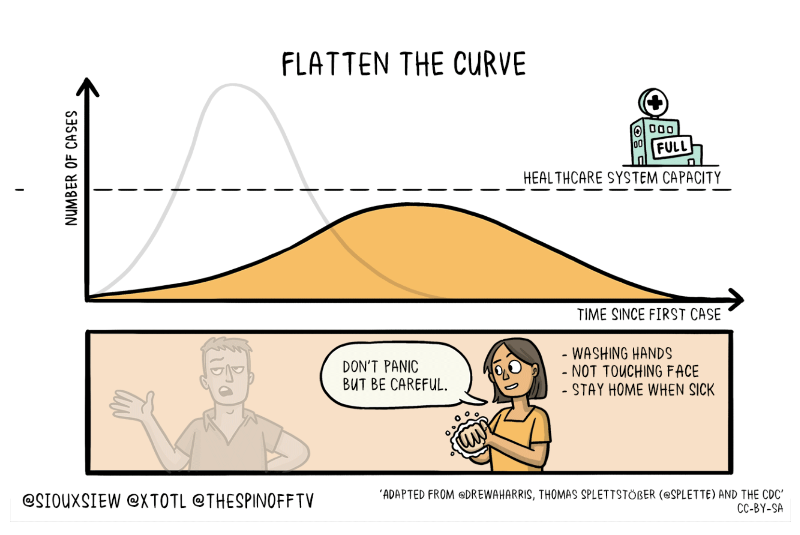Data uncertainty & COVID-19
Conversations with Data: #50
Do you want to receive Conversations with Data? Subscribe

As the COVID-19 crisis deepens, reporting and interpreting unclear data from clinical trials are essential for journalists. In this week's Conversations with Data podcast, we spoke with Dr. Siouxsie Wiles, an Associate Professor from the University of Auckland about the science and uncertain data behind the pandemic. As a microbiologist with a speciality in examining how infectious disease spreads, she debunks several conflicting health reports in the media and explains why antibody tests aren't a reliable option for mass screening.
You can listen to our entire 30-minute podcast with Dr. Siouxsie Wiles on Spotify, SoundCloud or Apple Podcasts. Alternatively, read the edited Q&A with her below.
What we asked
Tell us about your background in microbiology and infectious disease.
I'm an associate professor at the University of Auckland. I run a research lab where we mostly do antibiotic discovery. I'm really interested in the transmission of infectious diseases and how when we study those in the lab, the transmission is actually what is was most ignored.
I did my undergraduate degree in Microbiology specialising in infectious diseases of humans. Then I did a PhD in microbiology and focused on making bacteria glow in the dark to use as sensors for pollution. After I got my first post-doctorate position, I turned my focus back to infectious diseases and worked with the bacteria that causes tuberculosis by making it glow in the dark.

You're also a science communicator. How did you come up with those COVID-19 explainer cartoons?
For the past 10 to 15 years, I've been really interested in communicating science. So when COVID-19 happened, I'd already built up a reputation as somebody who could explain complicated science to the general public. As the pandemic began to spread in China, I was invited on breakfast TV to explain what was happening. I know how important it is to keep people informed and calm, but also to get them to do the right thing.
I've ended up having this amazing collaboration with a cartoonist called Toby Morris. We've been trying to distil some of these really important messages down into graphics that people can understand. For instance, what is exponential growth? And why should we stay at home? It's been really great to see these cartoons being taken up by governments in Australia, Argentina, and elsewhere.
How uncertain is the data for COVID-19?
What people are watching is science in action on an extremely accelerated scale. It's astonishing how much we know now since January and the fact that clinical trials are happening for treatments. But what that means is we are dealing with huge amounts of uncertainty.
The best picture we have at the moment is what happened in China. So the World Health Organisation and China did this joint mission where they put a report together. The report covers all of the classic things about epidemiology, including the case numbers, what is known about the virus and who gets it. At the moment, we're watching this kind of incredible experiment where we still don't know whether everything that came out of the report from China is going to play out the same way in other places. Other countries are doing fairly different things to control it and have different populations. That includes differing socioeconomic factors and access to healthcare.

What is certain when it comes to this pandemic?
I think the only thing that is certain is that this virus infects humans. It transmits human to human. And for some people, the outcome is pretty catastrophic. Because this outbreak is happening so fast, it has the massive capacity to overwhelm health systems, and that means that even though people might have survived with good treatments, they aren't going to survive because there aren't the intensive care beds or the ventilators to look after everybody who is sick.
Antibody tests have been spoken about widely. How reliable are they?
These are blood tests where you take a blood sample that looks for whether your body has made an immune response to the virus. So it is looking for antibodies called IgM and IgG. Depending on the test, I have seen some data where antibody tests only gave a correct result two out of 10 times. I've seen others where it gave you a correct result eight out of 10 times. And so that really matters if you're going to deploy the test widely and you're only going to get the right answer two at 10 times.

Dr. Siouxsie Wiles is a microbiologist and an associate professor at the University of Auckland.
Why do you think certain countries moved quickly with lockdown measures, while others responded slowly?
What's clear is that those countries that reacted really fast -- Taiwan, Singapore, Hong Kong -- are all countries that have dealt with things like SARS before. Those countries who responded fast know how serious these things can get and put in measures years ago for how you would respond in a pandemic situation. And that's really telling that those countries are the ones that are controlling it the best. Those countries that have taken a different approach have not had this experience before.
How is this going to play out? When will governments slowly lift lockdown measures?
While this isn't my area of expertise, the plan would be to either eliminate or vaccinate. And both of those plans are going to take time because every country is responding in different ways. What I imagine is going to happen is there may well be countries that keep it under control and they will be the ones who are able to open up to each other and not to others.
We might end up having little pockets around the world where life is kind of normal, but those pockets can only interact with other pockets like them. Perhaps people who want to travel to those places are going to have to show either they've had COVID-19 or they go into quarantine for two weeks before they are allowed in. It's just not clear how long this is going to take. If we're reliant on a vaccine, it's going to be 18 months or so.

Any advice for data journalists out there covering this?
Like many people, I'm watching the trackers showing the confirmed cases and deaths from this pandemic. It is important to remember that those numbers are becoming more and more unreliable every day. Many countries are not testing. For instance, at the moment, the U.K. is only testing those people who are in intensive care or healthcare workers. I think the other number to remember is that there will be lots of people who die who didn't die of COVID-19, but who died because of COVID-19. And I wonder whether those will ever be calculated. We have a massive undercount of confirmed cases and deaths. And it's not going be a long time before we really fully understand how this played out.

Long Reads on DataJournalism.com
We're looking for authors for our Long Read section. Whether you're a seasoned data journalist, a student, or a data visualisation expert, we're interested in sharing your expertise. Not sure what to pitch? Have a read of our guidelines. Get in touch with our data editor, Tara Kelly, at [email protected].
Our next conversation
In the next episode of our Conversations with Data podcast, we'll be talking to an expert about misinformation, data, and COVID-19.
As always, don’t forget to let us know what you’d like us to feature in our future editions. You can also read all of our past editions here.
Onwards!
Tara from the EJC Data team,
bringing you DataJournalism.com, supported by Google News Initiative.
P.S. Are you interested in supporting this newsletter as well? Get in touch to discuss sponsorship opportunities.
Time to have your say

Sign up for our Conversations with Data newsletter
Join 10.000 data journalism enthusiasts and receive a bi-weekly newsletter or access our newsletter archive here.
Almost there...
If you experience any other problems, feel free to contact us at [email protected]